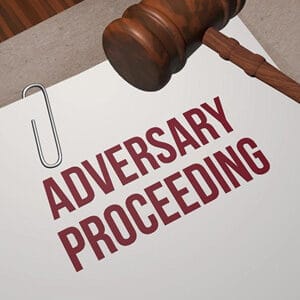
- Parties involved and who can file for an adversary proceeding in bankruptcy.
- Reasons for filing an adversary proceeding in bankruptcy.
- Common reasons why creditors might file for an adversary proceeding in bankruptcy.
Who May File For An Adversary Proceeding In A Bankruptcy?
Anyone who is a party of interest can file for an adversary proceeding. This includes:
- Creditors
- Debtors who file for bankruptcy
- Individuals who co-own property with another party
- The trustee’s office, including the United States Trustee’s Office, a subset of the Department of Justice, or standing trustees appointed to cases.
What Types Of Adversary Proceedings Come Up During Bankruptcy?
Both sides can file adversary proceedings during bankruptcy, though they usually fall into the following broad categories.
- Automatic Stay Disputes – The bankruptcy stay protects your assets during the bankruptcy process, ensuring that creditors cannot collect, including repossession. Sometimes they will try to do so anyways, or they will want to seize a particular asset you are OK parting with, in either case, an adversary proceeding may be required to stop them or proceed.
- Objections To Discharges Or Exemptions – sometimes parties will disagree over what should and should not be protected by exemptions, or which debts can and cannot be discharged through the bankruptcy process. These can result in adversary proceedings as they try to prove their case.
- Suspicions Of Fraud Or Deceit – occasionally, creditors will accuse a debtor of trying to undervalue assets, hide money, or some other fraud during the bankruptcy process. These cases get resolved through adversary proceedings and are one of the most important reasons to have a lawyer on your side during the process.
Regardless of the type of adversary proceeding, they are best handled by an experienced attorney, as they should not be taken lightly or ignored by either side.
What Reasons Would A Debtor File For An Adversary Proceeding In A Bankruptcy Case?
Debtors file for adversary proceedings in a bankruptcy case for the following reasons:
- Violation of the Automatic Stay: The automatic stay is a legal protection that prevents creditors from contacting debtors who have filed for bankruptcy without permission from the court. Sometimes, creditors may violate this protection, and debtors may need to file an adversary proceeding to stop them. An adversary proceeding allows the court to issue remedies, such as a restraining order, to stop harassing creditors.
- Dispute Over Asset Valuation or Ownership: If there is a dispute over the valuation or ownership of an asset, debtors may need the court to make a determination. An adversary proceeding allows debtors to obtain a judgment that determines property ownership.
Who Do You Represent In A Bankruptcy Adversary Proceeding?
Our office represents:
- Creditors: In some cases, creditors may need to file for an adversary proceeding. Our office represents creditors and can help them navigate the legal process.
- Debtors: Our office also represents debtors in adversary proceedings. We can help debtors defend themselves against legal claims or take legal action against harassing creditors.
- Trustees: Our office has also represented trustees in adversary proceedings. We can help trustees fulfill their legal responsibilities and navigate the complex legal process.
In an adversary proceeding, our representation can be on the offense, going after other creditors, or on the defense, defending clients against legal claims. Our goal is to help our clients minimize their risk and reach a favorable outcome.
What Reasons Might Creditors File For An Adversary Proceeding?
Creditors can file for an adversary proceeding in a bankruptcy case for a variety of reasons. The following are four common reasons why creditors might file for an adversary proceeding:
- Dischargeability: Creditors may file for an adversary proceeding to prevent a debtor’s debt from being discharged at the end of the bankruptcy case. This could happen if the creditor believes the debtor committed fraud, made misrepresentations, or breached a fiduciary duty. Creditors may also object to the discharge of a debt if a debtor failed to disclose assets or debts during the bankruptcy process.
- Fraudulent Transfer: Creditors may file for an adversary proceeding if they believe that a debtor transferred assets to another person or entity to avoid paying debts. Such a transfer is known as a fraudulent transfer and may be subject to being voided. The period of time during which a transfer can be voided varies depending on the state you live in, but it is typically within two to five years of the transfer.
- Preference: Creditors may file for an adversary proceeding if a debtor made a payment or transfer to them within a certain period before filing for bankruptcy. This payment or transfer is known as a preference and may be subject to being reversed or set aside.
- Object to Discharge as to Everybody: Creditors may file for an adversary proceeding to object to the discharge of a debt for all creditors, not just their own debt. This could happen if they believe the debtor filed for bankruptcy in bad faith or failed to comply with bankruptcy laws.
It’s important to note that while creditors are the most common parties to file for an adversary proceeding, other parties of interest, such as trustees, can also do so.
More Information:
- Actual And Constructive Fraudulent Transfer
- Fraudulent Transfer In A Bankruptcy Case
- Handling Adversary Proceedings In A Bankruptcy
- Types Of Adversary Cases In A Bankruptcy
For more information on Filing An Adversary Proceeding In A Bankruptcy, an initial consultation is your next best step. Get the information and legal answers you are seeking by calling (847) 200-0401 today.

Bach Is Your Financial Future.
Contact Us Today! (847) 200-0401

